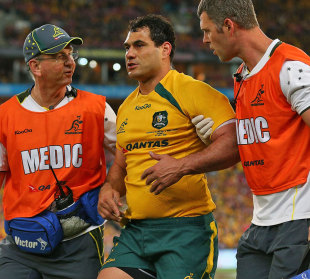|
International Rugby
IRB promise to address concussion concerns
ESPN Staff
July 18, 2013

Wallabies flanker George Smith is helped from the field during their third Test clash with the Lions in Sydney earlier this month - he returned shortly after
© Getty Images
Enlarge
The International Rugby Board has promised a 'full review' of their pitchside concussion assessment trial amidst growing concerns that it is endangering players.
Pitchside Suspected Concussion Assessment (PSCA)
The sport's governing body widened the Pitchside Suspected Concussion Assessment (PSCA) trial a year ago in a bid to underscore its commitment to player welfare. Under the trial, players who have sustained a head impact are able to leave the field of play for a five minute period of standardised assessment at which point a decision is made regarding their ability to return to the game. The PSCA is designed to give teams and match doctors time to assess cases in which concussion is not immediately apparent and the IRB has hailed it as a success with 25% more players being removed from the field of play permanently following a head impact. But critics, including former IRB chief medical advisor Dr Barry O'Driscoll, have questioned its credibility with the decision to allow a clearly-concussed George Smith return to action for Australia against the British & Irish Lions earlier this month fuelling the debate. In response, the IRB has 'reaffirmed their commitment to ensure best-practice concussion management procedure delivery' by promising to undertake an in-depth review of the use of the PSCA over the past year. In defence of their approach to the issue, the IRB has also stressed that it recognises the 2012 Zurich Consensus statement on concussion, widely recognised as the world's leading sports concussion forum, and that the PSCA protocols were adopted following expert independent neurological input. IRB chief medical officer Martin Raftery said: "The PSCA is intended to be a supportive tool for physicians in the elite Game. If a player is clearly displaying the signs of concussion, that player must be removed from the field of play and should not return to play." "Concussion management is at the very heart of the IRB's player welfare strategies and the message to players, coaches and parents is clear - if in doubt, sit it out." "Our Member Unions have supported the PSCA process and recognise the enormous benefits that the PSCA process delivers in this important area of player welfare." "All head injury incidents occurring within the PSCA trial are logged by the IRB Game Analysis unit for assessment. This review one year on from implementation will enable us to work with the physicians to review all the cases, identify practice learnings and reinforce the importance of following the correct procedures." "The area of concussion is highly emotive and diagnosis is complex, especially in the heat of the battle, and the PSCA was developed in line with international best practice to assist doctors and give them the best possible platform to assess their players when it is unclear whether concussion is apparent." "All the evidence suggests that the PSCA is proving to be a very effective tool to protect our players and team physicians are twice as likely to remove players from the field of play than independent medics, but we can and will continue to review and improve our practices to ensure that we are collectively doing all we can."
Meanwhile, the International Rugby Players' Association (IRPA) has backed the IRB's commitment to managing head injuries. "It is our view that the PSCA trial has been good for the health and wellbeing of our elite players," said IRPA Executive Director Rob Nichol. "It must be remembered that the Pitchside Suspected Concussion Assessment is only a tool to assist the medical practitioners make a clinical assessment, and that it is not definitive. From the moment a player takes a knock on the field, the medics should observe and assess that player." "They are responsible for applying their expertise and making the clinical judgement. If a medic is suspicious that a player has concussion at any stage, regardless of the outcome of a PSCA test, then he must be removed from the field of play and not return. This would include displaying symptoms of concussion as the player is treated on field, or as the player is escorted from the field." "It is about collective responsibility and we will continue to work in full collaboration with all stakeholders to ensure that players are fully educated as this is an area that all in Game take very seriously."
© ESPN Sports Media Ltd
| |||||||||||||||
Live Sports
Communication error please reload the page.
-
Football
-
Cricket
-
Rugby
-
- Days
- Hrs
- Mins
- Secs
F1 - Abu Dhabi GP
Abu Dhabi Grand Prix December 11-131. Max Verstappen ()
2. Valtteri Bottas (Mercedes)
3. Lewis Hamilton (Mercedes)
4. Alexander Albon ()
5. Lando Norris ()
6. Carlos Sainz Jr ()
-
ESPNOtherLive >>
Snooker - China Open
Tennis - Miami Open

